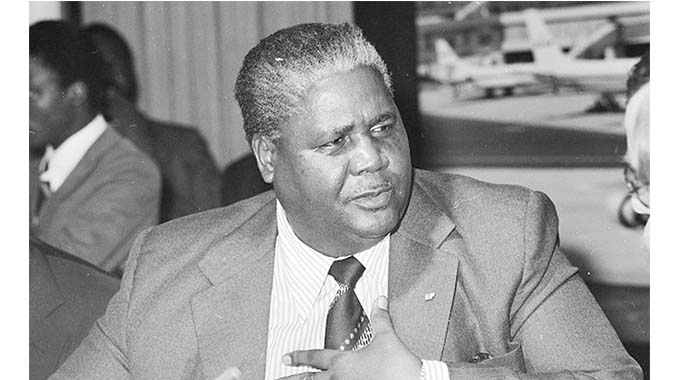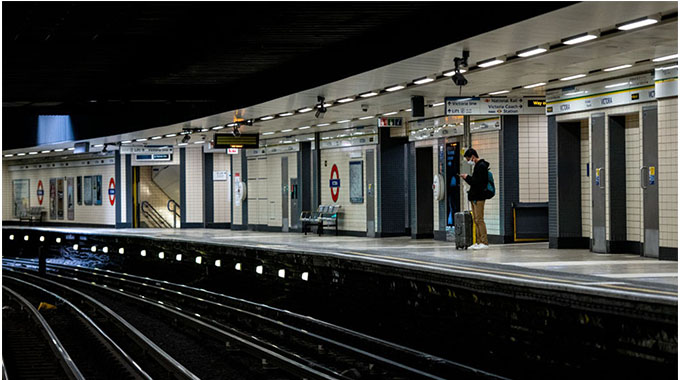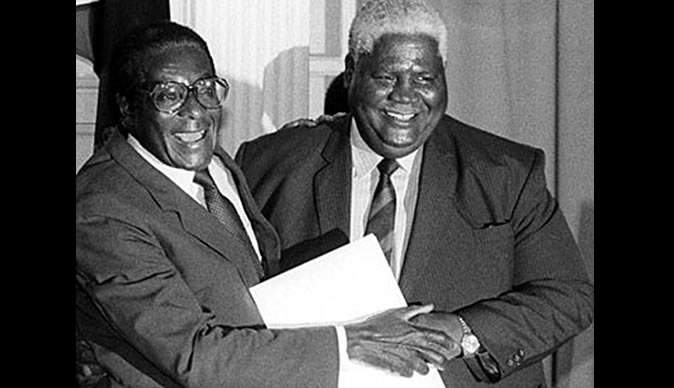Joshua Nkomo and Robert Mugabe in profile

The late former President, Cde Robert Mugabe and Dr Joshua Nkomo as leaders of Zanu (PF) and PF-Zapu respectively are the architects of the Unity Accord which they signed on December 22, 1987 to end civil disturbances in parts of Matabeleland region and Midlands Province.
Cde Mugabe passed away on September 6, 2019 while Dr Nkomo passed away on 1 July 1999.
Below, we publish their profiles:
Cde Mugabe was the founding President and First Secretary of the united Zanu-PF which came into being after the signing of the Unity Accord. He signed for Zanu-PF while Dr Joshua Nkomo signed for PF-Zapu. The united Zanu-PF has, since then dominated the local political scene, not only because of its close history with the masses dating back to the liberation war, but also its people-centred programmes.
President Mugabe was born on 21 February 1924 at Kutama Mission in Zvimba area, Mashonaland West province, about 80km west of Harare, son of the late Gabriel and Mrs Bona Mugabe, nee Shoniwa.
He got married in April 1961 to the late Sarah Francesca Hayfron (1932-1992) and remarried in August 1996 to Grace Marufu.
EDUCATION
BA Fort Hare University, South Africa, BA Administration, B.Ed (Unisa), BSc Economics, LLB, LLM and MSc Economics (University of London).
STATE & GOVT CAREER
First Executive President of the Republic of Zimbabwe (December 1987 to November 21, 2017)

The late President Robert Mugabe
First black Prime Minister of Independent Zimbabwe (April 1980 to December 1987)
TEACHING CAREER
Taught at various schools in Zimbabwe between 1942 and 1952. Lectured at Chalimbana Teachers’ Training College in Zambia (1955-58). Lectured on a four-year contract at St Mary’s Teacher Training College, Takoradi, Ghana (1958-60), terminated the contract at the behest of the National Democratic Party leadership and joined full-time politics.
HONORARY AWARDS
He has a number of honorary awards, including Hon LLB (Ahmadou Bello) Morehouse, University of Zimbabwe, Edingburg, St Augustine’s College, Massachusetts, Moscow, Michigan and Solusi.
Hon P Litt (Africa University) Hon P Civil Laws (Mauritius), Hon D Com (Fort Harare) and Hon D Tech (Nust).
SOME OF HIS INTERNATIONAL RECOGNITION
- Awarded the Order of Jamaica, September 1996,
- Assumed chairmanship of the OAU, June 1997
- Hosted the World Solar Summit, September 1996
- Elected first chairman of Sadc organ on defence, politics and security co-operation, June 1996
- Assumed chairman of the G-15 Group of Countries, November 1995
- Awarded the Olympic Order of Gold for his eminent contribution to Olympic ideals, September 1995
- Conferred chairmanship of the World Solar Commission, March 1995 – The commission seeks use of eco-friendly energy sources
- Assumed chairmanship of the Frontline States, March 1992 and led the OAU ad-hoc committee on Angola
- Hosted the 1991 Commonwealth Summit and assumed the chairmanship of CHOGM for three years
- Received the Jawaharlal Nehru Award, 1989
- Awarded the Africa Prize for leadership for the sustainable end to hunger on 15th September 1988 by the US-based Hunger Project – used the US$100 000 prize money to launch a national Agricultural Scholarship Fund
- Hosted and elected chairman of NAM, September 1986.
POLITICS
- The President and First Secretary of Zanu-PF December 1987 to November 21, 2017
- Led the party to repeated electoral victories from March 1980, 1985, 1995, 2000, and 2005 parliamentary elections and in the 1990, 1996, 2002, 2008 and 2013 presidential elections.
- Formed a government of national unity in 1980, drawing its membership from all major political parties to end a 15-year armed struggle
- Pronounced the policy of national reconciliation after winning the first national and democratic elections in March 1980
- Led the Zanu delegation to the Lancaster House Conference which ended the 15-year armed struggle, paving the way for the first all-race elections that led to majority rule on 18 April 1980
- Led the Zanu delegation to the abortive independence talks at Geneva (Switzerland, 1978) and Malta (1976).
- Elected President of Zanu in 1977 during the party congress in exile at Chimoio, Mozambique
- Escaped from the then Rhodesia into Mozambique in 1975 to reactivate the armed struggle and command Zanla, the military wing of Zanu following the assassination in a car bomb in Lusaka, Zambia in 1974 of Herbert Chitepo, the leader of the external wing and chairman of the party’s supreme decision-making body, Dare ReChimurenga
- Imprisoned between August 1964 and December 1974 for his political activism
- Used his detention time to further his education, acquiring three degrees
- Detained between December 1961 and March 1964.
- Founder member and secretary general of Zanu
- Acting secretary general and publicity secretary of Zapu until its banning in September 1962
- Edited party newspaper, The People’s Voice
- Co-founder member of Zapu, 10 days after the banning of the National Democratic Party in December 1961
- Chaired the first congress of the NDP in October 1960 an was chosen secretary for information and publicity, edited the Democratic Voice the official NDP mouthpiece
- Prematurely terminated his four-year contract in teaching in Ghana to return home in May 1960 where he threw his weight behind the nationalist movement’s struggle for independence and democracy. His education and experiences in Ghana in June 1958 where he came in contact with Ghanaian politics under the late founding President of that country, Kwame Nkrumah. Met Sarah Francesca Hayfron who he married in 1961
- Admitted to Fort Hare University where he came in contact with politics of decolonisation as expressed by the South African, African National Congress and other politically conscious students from other countries in the region and beyond
- Joined the Southern Rhodesia African National Congress
Dr Nkomo
The late Dr Joshua Nkomo was one of the founders of nationalism in Zimbabwe. He was involved in the earliest struggles against white misrule from the late 1940s. He played a prominent role in the 1948 general strike, which paralysed the whole country. After years of black opposition to white colonialism, the nationalists of the time decided to adopt a more confrontational stance, calling the general strike, which brought industry and commerce to a standstill.
One of the prominent figures he worked with was the late Grey Mabhalane Bango.
The 1948 strike was essentially a labour protest, in which black workers sought to protest against poor salaries and appalling working conditions they were forced to work under. But there was no way one could really divorce such a national protest from the politics of the time, for it was because of the colonial politics of the day that blacks were paid poor salaries while whites, some doing exactly the same jobs like blacks earned higher wages. It was also because of the oppressive and racist politics of the day that blacks were not allowed to advance their education. Blacks were supposed to stop going to school once they attained a Standard Six certificate. Only a lucky few went past that stage to enroll at teacher training institutions or nursing training institutions.
It was also because of the colonial politics of that time that blacks were barred from taking certain professions simply because of their skin colour, not the level of education they had. Blacks could never dream of working as medical doctors, lawyers or journalists in their lifetimes. Their professions were supposed to be in teaching, agricultural demonstration and so on. The idea was to ensure that blacks took up low-paying jobs so whites could dominate them economically, and by extension, politically.
At the time of the 1948 general strike, Dr Nkomo was working at the Rhodesia Railways (now National Railways of Zimbabwe) as a social worker. That was a fairly senior post, for blacks, who often got jobs as cleaners, scooter drivers, clerks, messengers and the like. He had acquired decent educational qualifications during his time in South Africa in the early 1940s.

The late Dr Joshua Nkomo
Dr Nkomo was a respected professional as a result. By virtue of his decent job, Dr Nkomo had managed to save enough to buy a vehicle, one of his contemporaries; Mr Bango told Chronicle a few years ago.
In an interview before he died, Mr Bango told Chronicle that as the general strike took hold, the trade unionists, travelled to the Njelele Shrine to see spiritual guidance. But, said Mr Bango, none of the union leaders of the time had a vehicle. So, said Mr Bango, they had to look around for a car to hire or simply asked for someone to lend them one to enable them to travel to the shrine.
They looked and looked around, but failed to get one. That was until they approached Dr Nkomo, who gladly agreed to help them with the vehicle. Together, they went to the shrine where they got the guidance they needed to prosecute the nationwide strike.
So apart from being a nationalist, Dr Nkomo was also a trade unionist of note. He managed to secure support from fellow trade unionists in the late 1940s to be elected to senior labour posts.
The confrontational strategy that Dr Nkomo, Mr Bango and their fellow black unionists used to address their workplace grievances was to transform into a more robust effort to fight for the political independence of the country in later years.
In 1951, Dr Nkomo became the leader of the African National Congress of Rhodesia. But the minority white regime of the day banned ANC. The banning of the party did not extinguish his nationalism and that of his peers as in 1960, at the formation of the National Democratic Party (NDP); he was elected its president.
Like its predecessor, the NDP was banned.
In 1962, Dr Nkomo and other political figures formed the Zimbabwe African People’s Union (Zapu). Again Zapu was banned on September 20 1962.
Frustrated with the suppression of political expression in the country, Dr Nkomo decided to form a government in exile. However, the move did not go down well with his fellow comrades.
Zapu split in 1963 and Zimbabwe African National Union (Zanu) was formed.
On 16 April 1964, Dr Nkomo was arrested, detained and spent the next 10 years at the notorious Gonakudzingwa detention camp, in the inhospitable southeastern Lowveld.
On his release in 1974, Dr Nkomo left the country to lead the armed liberation war, using Zambia as the base of the Zimbabwe People’s Revolutionary Army, which he led as its commander-in-chief.
His efforts and those of the people he commanded and the Zimbabwe African National Liberation Army (Zanla) defeated the Rhodesian army of Ian Smith, forcing the recalcitrant minority leader to the negotiating table. This led to a series of talks at Malta, Geneva and Lancaster and the attainment of Independence on 18 April 1980. Prior to Independence, Dr Nkomo had led his party, Zapu to the country’s first democratic election, and came second after Zanu.
He became the country’s first Minister of Home Affairs.
On 22 December 1987 he signed the Unity Accord that ended civil disturbances in Matabeleland and parts of Midlands and took up the post of Vice-President of the country. He championed unity, peace and national development in that capacity for 12 years until he passed on 1 July 1999.












Comments